…Aims to Harvest 4 Billion Liters, Reduce Runoff and Mitigate Erosion
By Adamu Abubakar Kumo

The Gombe State Agro-Climatic Resilience in Semi-Arid Landscapes (ACReSAL) project, through its Focal NGO, JEWEL Environmental Initiative has organized a one-day engagement with beneficiaries of rainwater harvesting initiative within the FCE(T) Catchment area in Gombe.
The catchment area is the site of ACReSAL’s ambitious 21-kilometer gully control project, which traverses over 19 distinct communities.
The engagement held at the Usman Shehu Abubakar Hall of Gombe State University is themed ‘Harvesting Hope: Sustainable Water Solutions for a Greener Future,’ which aim to educate participants from the affected communities on best strategies for effective and efficient rainwater harvesting.
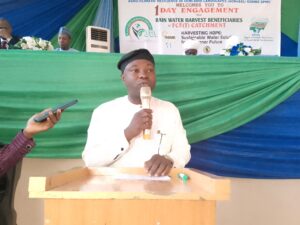
Declaring the engagement open, the State Project Coordinator of Gombe ACReSAL, Ambassador Dr. Sani Adamu Jauro commended the unwavering support of the Gombe State Government under the leadership of Governor Muhammadu Inuwa Yahaya.
He emphasized that the success of this intervention is a direct result of the Governor’s visionary leadership and commitment to environmental sustainability.
“Governor Inuwa Yahaya is a staunch environmental advocate, deeply committed to preserving and protecting the state’s natural resources. He consistently champions people-centered interventions aimed at restoring the ecological integrity of the state’s environment.”
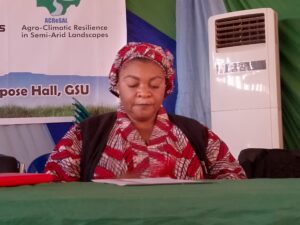
Dr. Sani Adamu explained that the engagement is an integral component of the watershed management plan which involved the distribution of 450 water tanks, each with a capacity of 4000 liters, across strategic locations within the the upper catchment of the gully.
“The plan focuses on reducing the volume of runoff, mitigating flooding and erosion, and ultimately preventing the loss of lives and property while preserving peopl’s safety and hygiene”, he stressed.
The State Project Coordinator expressed strong disapproval of individuals who are extorting money from beneficiaries or engaging in corrupt practices that undermine the project’s objectives. He assured all stakeholders that ACReSAL will take decisive action to prevent such unethical behavior.
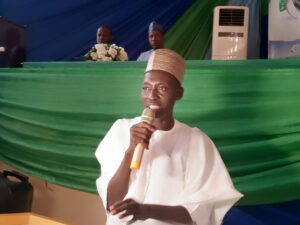
Earlier in his welcome address, the CEO of Jewel Environmental Initiative, Malam Ismail Bima Maigombawa said the initiative is a build up on ealier interventions where the ACReSAL project distributed water tanks to members of the affected communities.
“We therefore deamed it pertinent to engaged 500 beneficiaries and teach them the best practices to adopt in proper water harvest towards reducing the accumulation of runoff to reduce erosion, flooding and other aspects of land degradation.
“It will also help in reducing cost of supplying portable water for drinking and other domestic uses.” He said, cautioning the participants against selling the properties given as they belongs to the communities, individuals are just custodians.

In his remarks, the Senior District Head of Gombe, ably represented by Alhaji Musa Abubakar, Marafan Shamakin Gombe, commended the state government and the ACReSAL project for their impactful interventions that are positively improving the lives of the communities.”
He urged the participants and the general public to refrain from indiscriminate disposal of solid waste, particularly in drainage systems, as this contributes significantly to flooding.
The Senior District Head encouraged the beneficiaries of the distributed water harvesting materials to utilize them effectively and efficiently to achieve the intended purpose.
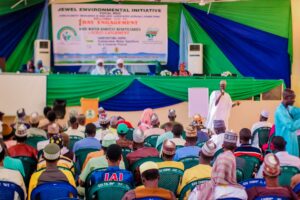
The engagement session featured presentations by Dr. Danladi Aliyu, SLO of JEI, on ‘Rainwater Harvesting Strategies: A Case Study of the FCE(T) Gombe Gully Intervention Corridor,’ and Kabiru Audu, SMO ACReSAL, on ‘Grievance Redress Mechanism Reporting Pathways.
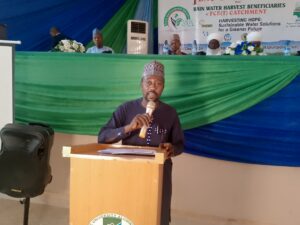
In his presentation, Dr. Danladi explained that the initiative aims to intercept and utilize an average of 1.6 million liters of rainwater on a rainy day which translates to approximately 88 million liters annually.
“Over a 50-year period, the project could potentially harvest a total of 4 billion liters of rainwater, which could significantly mitigate the impact of rainfall on erosion and other associated environmental problems”, he added.
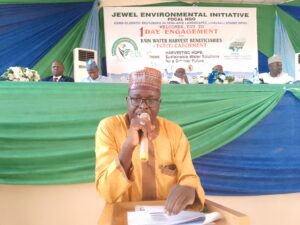
The session also included a lively discussion and Q& A segment, where participants shared their experiences, raised relevant questions, and offered valuable suggestions for improving the initiative.
“The initiative target 1.6 million liters in any rainy day. About 88 million liters annually could be intercepted and used as harvested rain water under the project and in 50 years a total of 4 billion liters could be harvested” Dr Danladi explained.
